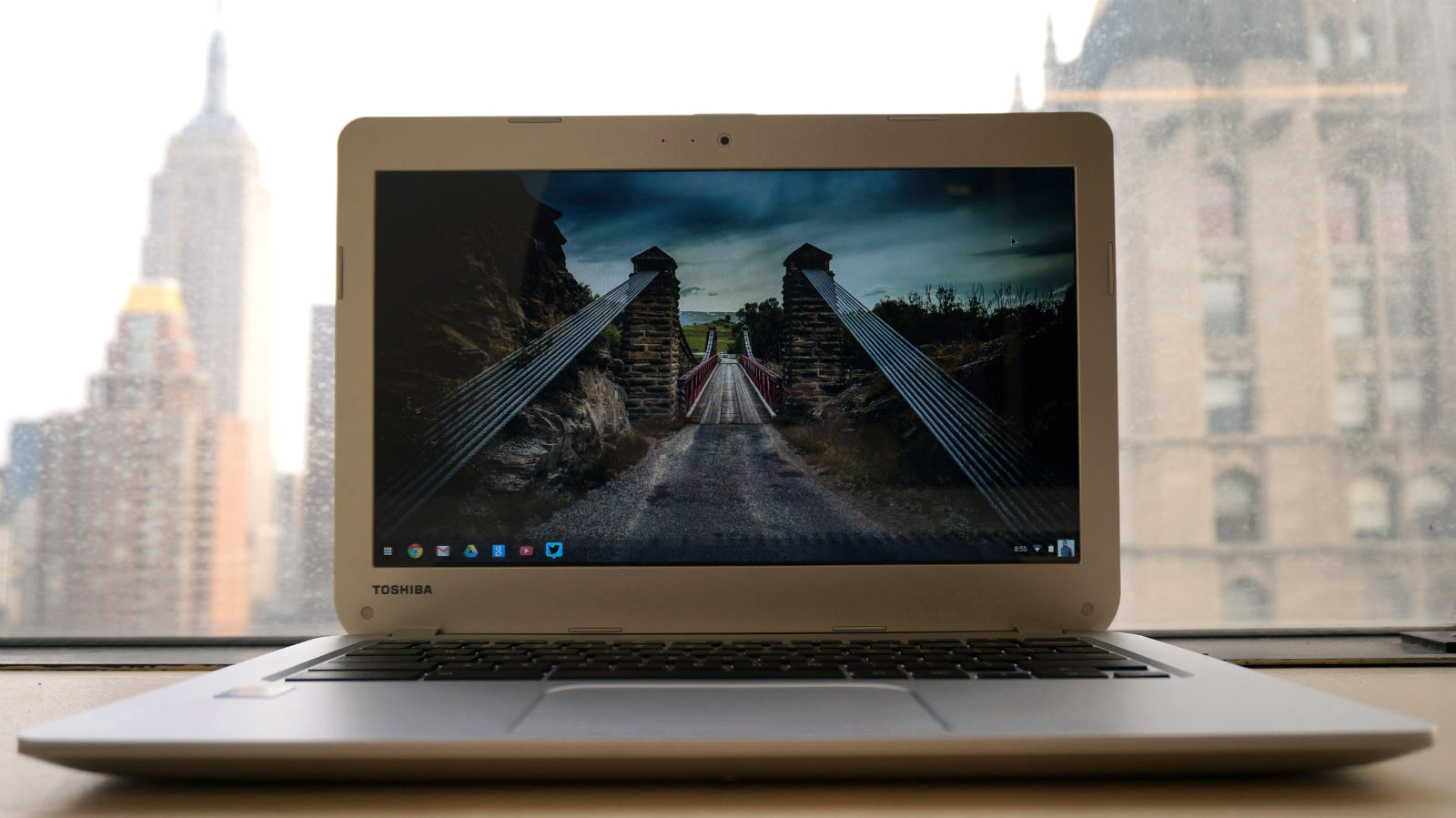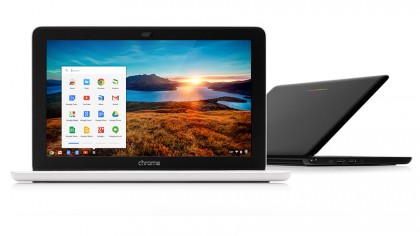Why you should seriously consider a Chromebook as your next laptop
Ultra-light and soon to be ultra-popular?

They're small. They're portable. They don't cost very much, and they don't run Windows. Sound familiar?
If you're thinking back to the heady days of the very first netbooks, so are we - but while Chromebooks do sound awfully like netbooks, that doesn't mean they're bound to suffer the same fate.
According to industry analysts NPD, from January to November last year Chromebooks' share of the commercial market rose from a titchy 0.2% to an impressive 9.6%.
Of the six and a bit million laptops shipped to education, business and public sector organisations via distributors in the US NPD says 1.6 million were Chromebooks, and in the run-up to Christmas three of the four best-selling laptops on Amazon were Chromebooks.
The UK figures aren't quite so dramatic, but they're still impressive: Context reports that 45,000 Chromebooks were sold in Western Europe in the first quarter of 2014, with 61.5% of those sales in the UK. That figure represents just less than one-tenth of total consumer notebook sales.
We've been here before, of course. Netbooks caused great excitement too, but by 2013 they were a dead computing category. Can Chromebooks do what netbooks couldn't? The signs suggest they can.
What nobbled netbooks
"Netbooks were no longer alternatives to crap Windows laptops. They *were* crap Windows laptops."
Sign up to the TechRadar Pro newsletter to get all the top news, opinion, features and guidance your business needs to succeed!
How did netbooks go from 20% of mobile PC sales in 2009 to virtually zero four years later?
The short answer is that people realised that netbooks weren't very good. The early promise - speedy flash storage, long battery life, low prices and Linux - was betrayed as manufacturers ditched Linux for Windows.
The move was for sensible enough reasons, because the mass market knew Windows and didn't know Linux, but it had serious ramifications: netbooks were no longer alternatives to crap Windows laptops. They *were* crap Windows laptops.
Windows was too big for flash storage so netbooks swapped the flash for slower hard disks. They ran ancient or crippled versions of Windows (XP initially and Windows 7 Starter later) that needed faster, more energy draining processors, and in many cases the manufacturers apparently assembled them from whatever old parts they found lying around the factory floor.
With proper laptops' prices in freefall, netbooks came to represent poorer and poorer value for money - and when the iPad turned up, it and its imitators drove the final nail into the Netbook's coffin.
Chromebooks are different. The lack of Windows is part of it: it means Chromebooks are running a new OS, not an ancient one, and it's a mobile OS, not a desktop one. The hardware's pretty good too, especially now Chromebooks are running energy-sipping Haswell processors, and the mass market has changed.
The rise of tablets and smartphones mean we're used to using non-Windows OSes, and while the average punter might not know what Linux is, they do know about Chrome. Chances are, they're already using it.
8 out of 10 cats like Chrome
Chrome is the world's most used browser. The most recent figures from Shareaholic show a 34.65% market share for Chrome; that's more than Firefox, Internet Explorer 11 and Opera combined.
StatCounter gives Chrome 43.55%, nearly double IE and more than double Firefox. Even NetApplications figures, which count user numbers rather than web pages viewed, gives Chrome the edge over IE11, Firefox and Safari.
That's important because Chrome isn't just a browser. It's a platform. The Chrome Web Store is filling with Chrome apps that do exactly what you'd expect traditional desktop apps to do, whether that's streaming from Spotify or Netflix, working on documents or editing text.
And of course those apps are cross-platform, so if you use them on your PC or Mac you can use them on a Chromebook.

Chromebooks also benefit from the wider shift to cloud computing. In the five years since netbooks first appeared we've embraced the cloud for all kinds of things: the aforementioned media streaming, Google Drive, Dropbox, Evernote… we're undergoing a generational shift from using our computers as stand-alone devices to using them primarily as windows onto cloud services (that's windows with a small "w").
We're increasingly used to using multiple devices - PCs, smartphones, tablets - to access the same services, and stripped-down cloud-friendly laptops make a lot of sense in that environment, especially now that Wi-Fi is widespread and Chromebooks are no longer lost when you take them offline. Chromebooks are easy to administer, don't suffer from malware to the extent Windows XP did, and haven't been hurt by Microsoft's well-publicised Windows 8 woes.
In many respects netbooks were ahead of their time, and now Chromebooks are delivering what netbooks promised but couldn't yet deliver.
Spoiling Chromebooks' shine
But Chromebooks can still wrest defeat from the jaws of victory. As Kevin Lee points out in his (positive) review of Dell's Chromebook 11, Google really needs to give the Chrome Web Store a kicking and attract more third-party apps.
It's not just software, though. Some Chromebooks can feel underpowered - 2GB of RAM doesn't really cut it if you want former PC/Mac users to feel happy on a Chromebook; I'm using more than that in my web browser as I write this - but happy Chrome users such as our very own Joe Osborne still find it easy to make even the most recent Chromebooks chug along.

Even when firms do get it right, as HP did with its Chromebook 11, that doesn't mean they'll keep things that way. The 2nd generation Chromebook 11 appears to be worse than the first, with a poorer screen, poorer audio and more weight.
The big question is whether Chromebooks can make the move from single-use devices - such as simple web-app clients for business users or notebooks for students - to multi-use devices that replace traditional Windows (and Mac) laptops for the rest of us.
If manufacturers can resist a netbook-style race to the bottom where price is more important than quality, Chromebooks' future could be very shiny indeed.
Contributor
Writer, broadcaster, musician and kitchen gadget obsessive Carrie Marshall has been writing about tech since 1998, contributing sage advice and odd opinions to all kinds of magazines and websites as well as writing more than twenty books. Her latest, a love letter to music titled Small Town Joy, is on sale now. She is the singer in spectacularly obscure Glaswegian rock band Unquiet Mind.
